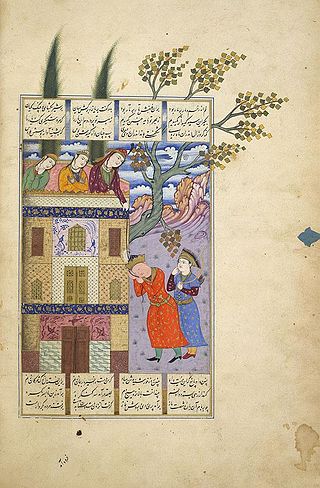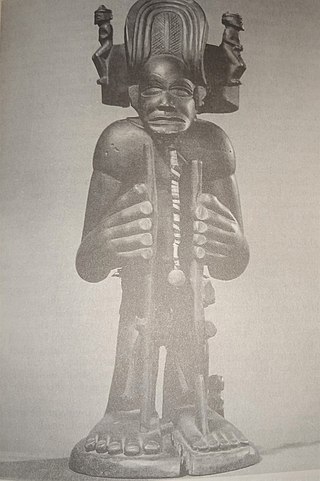Related Research Articles
The pre-colonial history of the modern-day Democratic Republic of the Congo encompasses the history of the Congo Basin region up to the establishment of European colonial rule in the era of New Imperialism and particularly the creation of the Congo Free State and its expansion into the interior after 1885. As the modern territorial boundaries of the Democratic Republic of the Congo did not exist in this period, it is inseparable from the wider pre-colonial histories of Central Africa, the Great Lakes and Rift Valley as well as the Atlantic World and Swahili coast.

Zāl, alternatively spelled as Zaal, is a legendary Iranian king from Sistan, and is recognized as one of the greatest warriors of the Shahnameh epic. He is the father of the equally legendary Iranian hero, Rostam.

Sarsa Dengel, also known as Sarsa the Great, was Emperor of Ethiopia, and a member of the Solomonic dynasty. His throne name was throne name Malak Sagad I. He is considered one of the greatest warrior-kings of the Ethiopian Empire.

The Lukuga River is a tributary of the Lualaba River in the Democratic Republic of the Congo (DRC) that drains Lake Tanganyika. It is unusual in that its flow varies not just seasonally but also due to longer term climate fluctuations.

The Luba people or Baluba are a Bantu ethno-linguistic group indigenous to the south-central region of the Democratic Republic of the Congo. The majority of them live in this country, residing mainly in Katanga, Kasaï, Kasaï-Oriental, Kasaï-Central, Lomami and Maniema. The Baluba consist of many sub-groups or clans.
Madra kingdom was a kingdom grouped among the western kingdoms in the ancient Indian epic Mahabharata. Its capital was Sagala in the Madra region. The Kuru king Pandu's (Pāṇḍu) second wife was from Madra kingdom and was called Madri. The Pandava twins, Nakula and Sahadeva, were her sons. Madri's brother Shalya was the king of Madra. Though affectionate to the Pandavas, he was tricked to give support to Duryodhana and fought against the Pandavas during the Kurukshetra War. He was killed by Yudhishthira, the eldest Pandava. Other than the Madra kingdom with Sagala as its capital, it is believed that there was a Western Madra and a Northern Madra.
The Bakwa Dishi is a people belonging to the Luba ethnic group living today in the Kasai-Oriental Province in the Democratic Republic of Congo. Miabi, the Dishi Capital, is located 16 miles (26 km) West of Mbuji-Mayi. The territory of the Bakwa Dishi lies on approximately 1,900 square miles (4,900 km2), which is known as the Miabi territory.
Ilunga Mbidi was a soldier and cultural hero of the Luba and Lunda people.

Tshibinda Ilunga or Chibinda Yirung was a Luba and founder of the Lunda Kingdom that covered large parts of modern Democratic Republic of the Congo and Angola.
Ilunga Tshibinda was a Mwata Gaand of Luba descent. He was the second son of Ilunga Mbidi and younger brother Kalala Ilunga.
Kongolo was a leader of Luba people in the region of Katanga, and the first king of the Luba Empire. He built his capital in Mwibele, near Lake Boya. Kongolo Mwamba was trying to extend his kingdom by conquering the neighbouring Songye chiefdoms.

The Unknown Warrior is an unidentified member of the British Imperial armed forces who died on the western front during the First World War. He is interred in a grave at Westminster Abbey, also known as the Tomb of the Unknown Warrior.

The Vira people or Bavira are one of the most numerous ethnic groups in the Eastern Democratic Republic of the Congo. These people are located in the region of Uvira in the East of the country, on the northeast coast of Lake Tanganyika at the border with Burundi. The Bavira are also known in the name of Benembuga in Kivira which means "authentic Uvira citizens."

The Luba Empire or Kingdom of Luba was a pre-colonial Central African state that arose in the marshy grasslands of the Upemba Depression in what is now southern Democratic Republic of Congo.
Katende, or Sungu-Katende, was a royal sacred village of the Kingdom of Luba. It was adjacent to the village of Kabondo. Katende is on the upper Lomami in the Lualaba region in the Democratic Republic of the Congo.
Ilunga Sungu was a ruler (Mulopwe) of the Kingdom of Luba in what is now the Katanga Province of the Democratic Republic of the Congo, said to have reigned from about 1780 to his death.
The Hemba people or Luba-Hemba people are a Bantu ethnic group in the Democratic Republic of the Congo (DRC).

Luba art refers to the visual and material culture of the Luba people. Most objects were created by people living along the Lualaba River and around the lakes of the Upemba Depression, or among related peoples to the east in what is now the Democratic Republic of the Congo.

Lukasa, "the long hand", is a memory device that was created, manipulated and protected by the Bambudye, a once powerful secret society of the Luba. Lukasa are examples of Luba art.

The Monarchy of Germany was the system of government in which a hereditary monarch was the sovereign of the German Empire from 1871 to 1918.